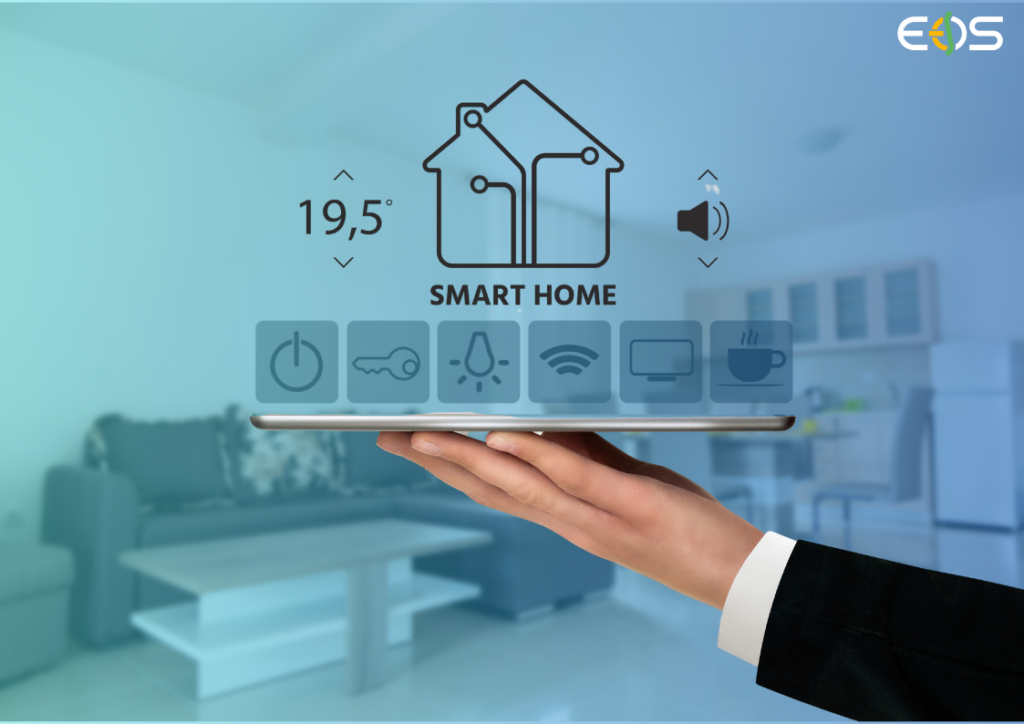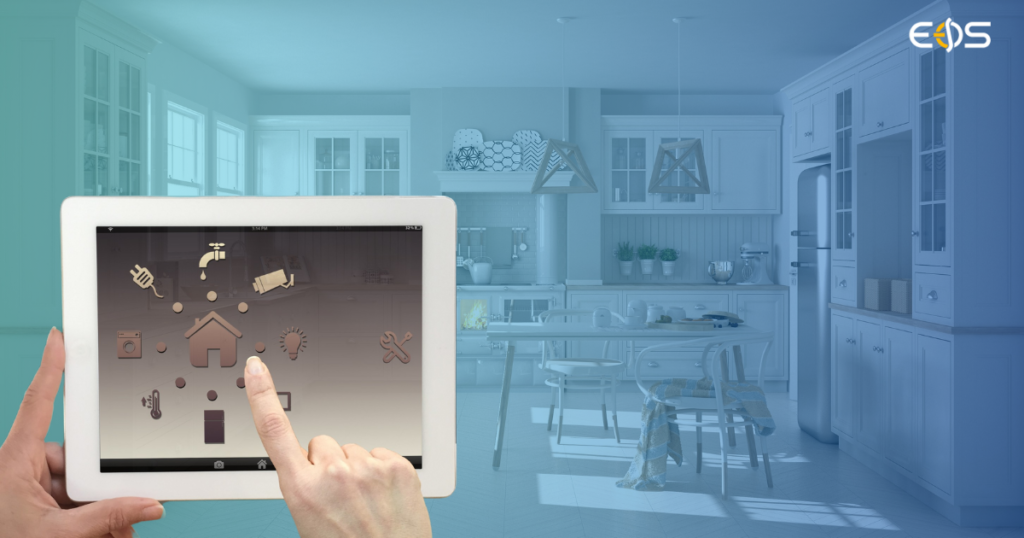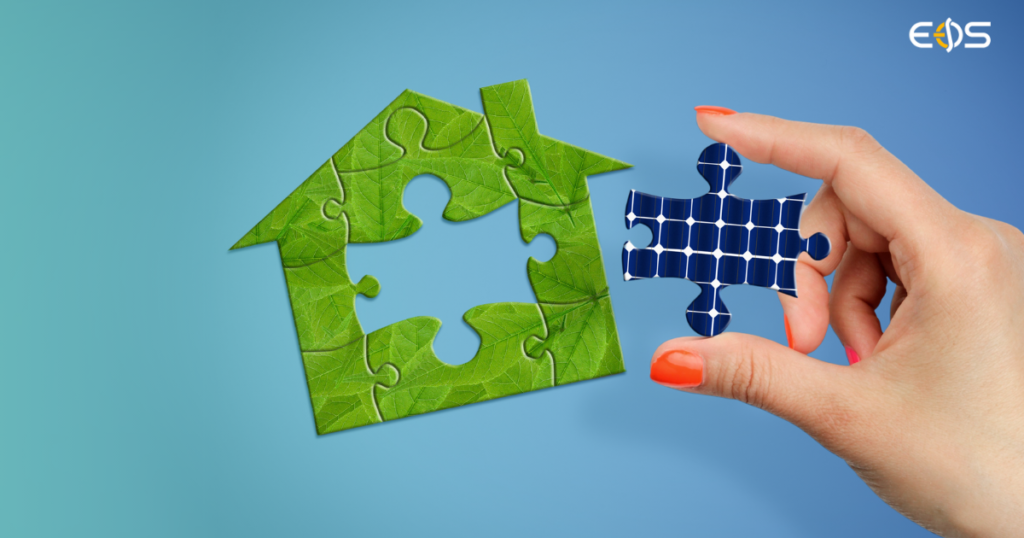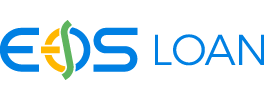Smart homes are redefining the way people live, bringing automation, connectivity, and efficiency to everyday life. In the U.S., this shift is creating new opportunities for contractors and home improvement companies. In this article, we’ll explore how smart homes and solar energy work together to drive sustainability and innovation.

Smart Homes: The Concept and Practice
It is common to think of smart homes as a single, complete solution, with a central hub that connects all aspects of the home. However, many automations and features of connected homes are already present in the lives and homes of Americans.
- Lighting Control: Users can turn lights on or off remotely via smartphones or voice assistants, and schedule automatic activation times.
- Security: Integrates camera systems, alarms, and electronic locks, enabling remote monitoring and access control. Sensors can alert about unauthorized entries and offer direct communication with emergency services.
- Temperature Control: Smart thermostats allow users to adjust the home’s temperature before arrival, optimizing the use of heating and air conditioning.
- Appliance Automation: Devices like coffee makers and ovens can be programmed to operate at specific times or be activated remotely.
- Energy Management: Systems can monitor energy consumption and automatically adjust devices to save energy, such as turning off lights or appliances when not in use.
- Curtain and Blind Control: Automated blinds can be programmed to open or close at specific times, helping regulate internal temperature and take advantage of natural light.
- Sound System: Allows audio distribution in different areas of the house, with individual volume control and music selection.
- Automatic Irrigation: Sensors measure soil moisture and activate garden irrigation systems as needed, ensuring plants are kept in ideal conditions.
- Virtual Assistants: Integration with assistants like Amazon Alexa or Google Assistant allows voice control over various home devices.
Smart homes integrate advanced automation systems to enhance comfort, security, and energy management. Devices like smart thermostats, automated lighting, security systems, and voice assistants (e.g., Amazon Alexa, Google Assistant) allow seamless control over home operations. These features are transforming modern living, making energy efficiency more accessible than ever.
Growing Adoption of Smart Homes in the U.S.
The smart home market in the United States is in full expansion. Driven by the pursuit of convenience, efficiency, and sustainability, the growth of this sector is remarkable. Studies indicate that residential automation is becoming increasingly accessible and attractive to various social classes, especially with technological advancements and reduced device costs.
- Overall Ownership: As of 2024, approximately 65% of Americans own at least one smart home device, a notable increase from 51% in 2020. This reflects a growing familiarity with smart technologies among consumers.1).
- Household Statistics: About 30% of U.S. households have adopted at least one smart home device, with projections suggesting this could rise to 50% by 2025. Furthermore, nearly 30% of internet-connected households have three or more smart devices, with an average of 7.1 devices per household.2).
By 2030, the market is expected to grow to $78.92 billion, driven by consumer demand for convenience and automation. This shows us an unstoppable trend towards increasing adoption of smart home solutions, which, combined with rapid technological advancement, is transforming the way we interact with our home.
This revolution is underway. The Yougov report, for example, already indicated that, by 2024, the adoption of smart homes would increase significantly, with 65% of Americans owning some system or device related to home automation.
- 30% of U.S. households currently use smart home technology, expected to reach 50% by 2025.
- Security remains a top priority, with 70% of consumers focusing on smart security solutions.
- Younger generations are leading adoption, with 29% of Americans under 45 owning smart lighting systems.

Sustainability and the Role of Residential Automation:
Despite the moves made by the current federal government, concerns about sustainability remain on the market agenda and in families’ consumption intentions – which is reflected in the adoption of green technologies in smart homes. Smart homes not only offer convenience, but also contribute to energy efficiency and reduced environmental impact. Solar energy systems are a fundamental solution to meet the demands of a sector that combines technology and environmental responsibility.
Smart homes demand equally intelligent energy solutions. In the United States, photovoltaic systems fit perfectly into this concept, offering a series of essential benefits to support the continuous and efficient operation of smart homes. They ensure energy security, resilience against grid failures, real-time monitoring, and energy efficiency.
- Energy Security and Resilience: Smart homes have a high dependence on electricity to keep their systems interconnected. From HVAC (heating, ventilation, and air conditioning) devices to fire monitoring and remote control of equipment, technological homes need a constant supply of electricity. Solar systems offer resilience against grid failures, especially during severe weather events or outages, and autonomy, combining the use of solar panels with battery storage to provide uninterrupted energy to critical systems in smart homes (1).
- Real-Time Monitoring: A key feature of a smart home is the ability to monitor various home resources in real-time, such as security, electricity consumption, and more. Solar energy systems are perfectly aligned with this reality, allowing continuous monitoring of energy generation and consumption, providing the end consumer with an accurate view of how they are using their energy. They integrate directly with automation tools, allowing the system to be controlled remotely, generating more efficiency and savings (2).
- Energy Efficiency: Smart homes consume significant amounts of energy with intelligent devices such as residential assistants, sensors, automated lighting, and HVAC devices. Electric vehicle chargers are also becoming standard in modern homes. Solar energy, with zero cost after installation and flexible financing options, is the best solution to meet these new consumption patterns without financially overburdening smart home owners (3).

Solar Opportunities for Contractors.
The growth of smart homes represents an unparalleled market opportunity for contractors in the United States. By collaborating with real estate developers, it is possible to scale projects and attract new consumers who value sustainability and connected technology. Incorporating solar systems into real estate projects adds significant value to both consumers and companies in the sector.
Benefits of Integrating Solar Systems:
- Property Value Increase: Homes with photovoltaic systems have higher added value and attract conscious buyers. According to the international market, properties equipped with solar panels can see up to a 20% increase in value compared to similar properties without the system (3).
- Support for Sustainability: Incorporating solar energy reinforces builders’ commitment to ESG policies, meeting the expectations of investors and consumers for more responsible practices.
- Savings for the Clients: Besides the environmental benefit, consumers save over the years thanks to low or virtually nonexistent electricity bills for well-dimensioned solar systems.
- Staying one step ahead of rising energy consumption: Electric vehicles, HVAC, and other technologies depend on robust sources. Incorporating solar energy today prepares properties for future demands.
The growth of the smart home market and the demand for sustainable technologies in the United States go hand in hand. Solar energy plays an essential role as the energy base for connected, resilient, and sustainable homes of the future. This is the moment for solar integrators and builders to act and seize this expanding market, turning challenges into brilliant opportunities.
At Eos Loan, we are here to help you take advantage of this expanding market. Together, we can turn challenges into brilliant solar opportunities. 🌞
